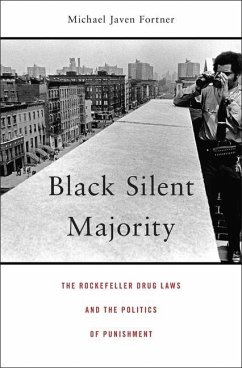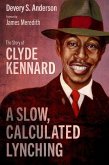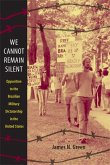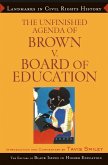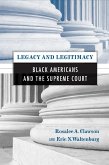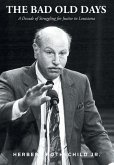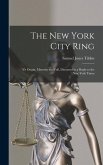Aggressive policing and draconian sentencing have disproportionately imprisoned millions of African Americans for drug-related offenses. Michael Javen Fortner shows that in the 1970s these punitive policies toward addicts and pushers enjoyed the support of many working-class and middle-class blacks, angry about the chaos in their own neighborhoods.
Hinweis: Dieser Artikel kann nur an eine deutsche Lieferadresse ausgeliefert werden.
Hinweis: Dieser Artikel kann nur an eine deutsche Lieferadresse ausgeliefert werden.
Provocative... As Fortner's book makes clear, no political movement can afford to ignore the kind of cruel disorder that we euphemistically call common crime. A police force that kills black citizens is adding to America's history of racial violence; so is a police force that fails to keep them safe.
-- Kelefa Sanneh New Yorker
Seeks to reverse the conventional wisdom about not only the Rockefeller laws themselves, but also the broader history of the war on drugs... After Black Silent Majority, historians can no longer reduce the '60s and '70s politics of crime to the delusional fantasies of racists or to statistical artifacts of modern police record-keeping (although those factors surely played a role as well). Fortner marshals an array of poll data showing that black city dwellers were-and not without reason-far more fearful of violence in the late 1960s than white suburbanites were.
-- Sara Mayeux Reason
This provocative history alerts a rising generation of would-be reformers-the young masses that have recently filled the streets of New York and other cities to protest after each new tragedy-to how a well-intentioned proposal can lead to something unintended and disastrous, like mass incarceration. This lesson should resound, given the political clout the criminal-justice-reform movement continues to acquire.
-- Jack Dickey Time
A fresh, bold, powerful book that shakes up a pressing contemporary debate. Fortner insists on listening to the black voices that supported the rise of our terrible incarceration policies. Through careful research, he describes a deeply conflicted community-confronting crime, groping for respectability, challenging the white gaze, and reaching for social justice. Black Silent Majority is forcefully argued, beautifully written, and profoundly moving.
-- James A. Morone, author of Hellfire Nation and The Devils We Know
Meticulously researched, engagingly written, and rigorously argued, this important and long-overdue work will be essential reading for anyone concerned with the hidden complexities of African American life. Fortner illuminates the problems that the majority of working- and middle-class blacks face from criminal elements within their communities; the sometimes patronizing indifference of white and black liberals toward them, compounded by the manipulation of their concerns by conservatives; and the tragic, unintended consequences of a flawed drug and penal policy they were driven, out of despair and fury, to support. This is a major contribution to our understanding of the interaction of class, race, and public policy in America.
-- Orlando Patterson, Harvard University
-- Kelefa Sanneh New Yorker
Seeks to reverse the conventional wisdom about not only the Rockefeller laws themselves, but also the broader history of the war on drugs... After Black Silent Majority, historians can no longer reduce the '60s and '70s politics of crime to the delusional fantasies of racists or to statistical artifacts of modern police record-keeping (although those factors surely played a role as well). Fortner marshals an array of poll data showing that black city dwellers were-and not without reason-far more fearful of violence in the late 1960s than white suburbanites were.
-- Sara Mayeux Reason
This provocative history alerts a rising generation of would-be reformers-the young masses that have recently filled the streets of New York and other cities to protest after each new tragedy-to how a well-intentioned proposal can lead to something unintended and disastrous, like mass incarceration. This lesson should resound, given the political clout the criminal-justice-reform movement continues to acquire.
-- Jack Dickey Time
A fresh, bold, powerful book that shakes up a pressing contemporary debate. Fortner insists on listening to the black voices that supported the rise of our terrible incarceration policies. Through careful research, he describes a deeply conflicted community-confronting crime, groping for respectability, challenging the white gaze, and reaching for social justice. Black Silent Majority is forcefully argued, beautifully written, and profoundly moving.
-- James A. Morone, author of Hellfire Nation and The Devils We Know
Meticulously researched, engagingly written, and rigorously argued, this important and long-overdue work will be essential reading for anyone concerned with the hidden complexities of African American life. Fortner illuminates the problems that the majority of working- and middle-class blacks face from criminal elements within their communities; the sometimes patronizing indifference of white and black liberals toward them, compounded by the manipulation of their concerns by conservatives; and the tragic, unintended consequences of a flawed drug and penal policy they were driven, out of despair and fury, to support. This is a major contribution to our understanding of the interaction of class, race, and public policy in America.
-- Orlando Patterson, Harvard University

